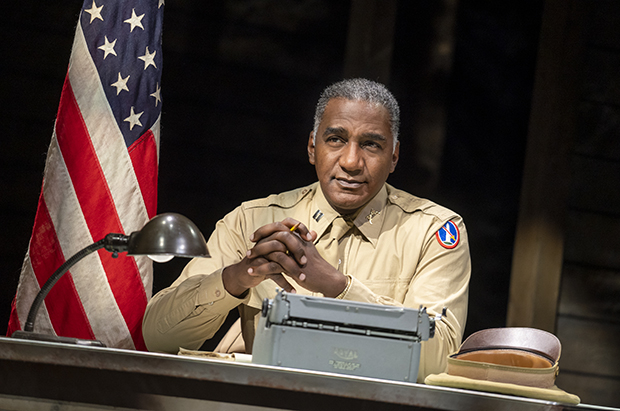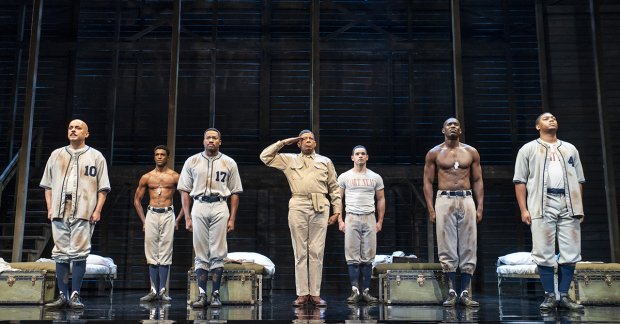Review: A Soldier's Play Touring Production Marches Out of Step With Its Superior Broadway Run

(© Joan Marcus)
The national tour of A Soldier's Play arrives in Philadelphia on a raft of personal significance. Charles Fuller — the work's Pulitzer Prize-winning author, who died last October — grew up in the city's Strawberry Mansion neighborhood. His alma mater, Roman Catholic High School, renamed a theater on its campus in his honor during the engagement, with actors from the production present at its dedication.
Although Fuller achieved his greatest successes elsewhere, he made significant contributions in the early days of Philly's resident theater movement, co-founding the now-defunct Afro-American Arts Theater in 1967. It is heartening to see his most famous play onstage at one of the city's most storied venues, the Forrest Theatre.
Unfortunately, just four stops into a 6-month road engagement, the road company of Roundabout's 2020 revival already looks tired and workmanlike. Stiff acting and slack pacing suck the air out of Fuller's great military mystery, which concerns the murder of malevolent Sergeant Vernon C. Waters (Eugene Lee), the supervisor of an all-Black army regimen in segregated Louisiana during World War II.
Fuller distilled the realities of racism, on both a national level and among the servicemen, into his story. When Captain Richard Davenport (Norm Lewis), an army lawyer, descends from Washington to investigate Sgt. Waters's death, he is the highest-ranking officer of color that many of the enlisted men have ever seen. His confidence and singlehanded focus on gleaning the truth breeds discomfort in Captain Charles Taylor (William Connell), an officer of equal stature who fears that the presence of a Black investigator will hamper the pursuit of justice.
Throughout the play, Fuller balances taut procedural elements with a searing indictment of prejudice and injustice. Waters is presented as self-hating and overly deferential to his white superiors; he freely uses racial epithets toward the men under his command, and he endorses racist ideas of how Black men should act in order to gain favor in a white power structure. The Black soldiers are treated disdainfully and made to do manual labor on the base, like painting an officers' club that they are not allowed to patronize. When it is finally announced that the unit will ship out to Europe and see combat, it quickly becomes clear that they will all perish.

(© Joan Marcus)
When this production opened on Broadway, director Kenny Leon maintained an airtight level of suspense throughout the proceedings, and he wedded the play's distinctive stylistic elements to the core of the storytelling. The rhythmic movements of the company evoked both the regimented marches of the military and the percussive tradition of step-dancing that has its roots in the Black south. The acting, to a man, was sensitive and superb.
Here, the seams show in a way that makes the play itself feel past its sell-by date, even as the themes it addresses still resonate on a deep level. This is partially due to miscasting in the leading roles. Lewis, a veteran Broadway baritone, lacks the gravitas to convince the audience of Davenport's self-possession; when he has nothing to sing, he appears lost onstage. (Thankfully, we get to hear a bit of his still-gorgeous voice at the top of Act 2.)
Lee, who took a small role in the Negro Ensemble Company's original staging of this play, seems neither scary enough when Waters is in charge or pitiful when he realizes the pain that his subservient worldview has caused his soul. Lee tended to garble his words at the performance I attended, which was not helped by an amplification system that malfunctioned several times.
The ensemble members give largely perfunctory performances, with a few exceptions. Sheldon D. Brown is quietly moving as Private C.J. Memphis, a gentlehearted soldier whose country ways inspire Waters's wrath. Howard W. Overshown is appropriately pathetic as Private James Wilkie, who becomes Waters's henchman in an attempt to restore his army rank. But Tarik Lowe, in the pivotal role of Private First Class Melvin Peterson, is not nearly as menacing as he should be.
The most striking elements here are technical ones: Allen Lee Hughes's purposefully murky lighting design; Derek McLane's spare, ramshackle set. And the opportunity to pay tribute to Fuller in the city he called home in a commendable one. But overall, this Soldier's Play should be decommissioned.












